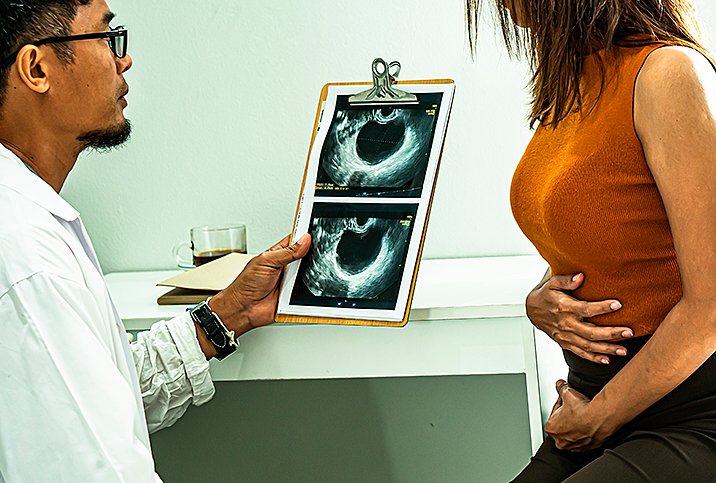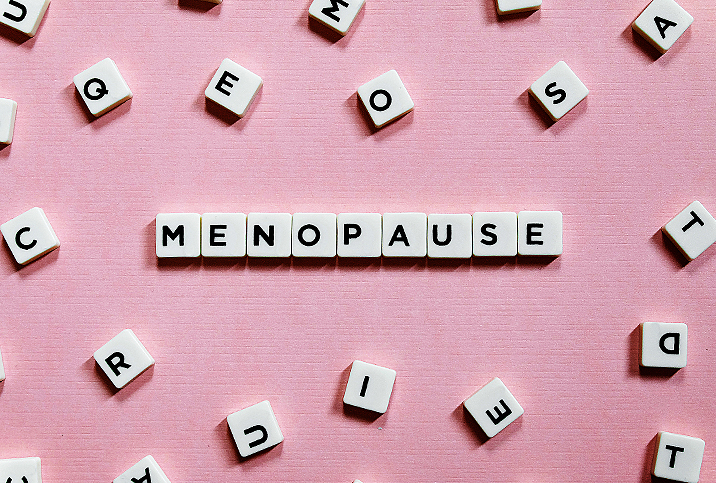PCOS Symptoms Should Cease After Menopause

Polycystic ovary syndrome (PCOS) is a hormonal condition with no clear clinical criteria, according to Sharon D. Malone, M.D., FACOG, medical director of Alloy Health. That means it can be challenging to actually identify when someone has PCOS.
To diagnose PCOS, doctors rely on a series of symptoms that are most often associated with the condition, such as hyperandrogenism (causing acne and hirsutism, or increased facial hair) and infrequent or absent menstruation (oligomenorrhea). Contrary to the name of the condition, added Malone, ovarian cysts aren't a necessary symptom for diagnosis, nor does the absence of cysts rule out the condition.
Clearly, this condition can be confusing. And as people with ovaries approach menopause, PCOS may get even more baffling, as the symptom of perimenopause (the transition time into menopause, which can last for years) can be similar to PCOS. If you're one of the 5 million women suffering from polycystic ovary syndrome, here's what you need to know as you approach menopause.
Is it perimenopause or PCOS?
Because perimenopause and PCOS can have similar symptoms, such as irregular periods or menstruation cessation, it might be difficult to distinguish between the two. However, there are a few clues that can help you identify which condition you are dealing with.
More regular cycles
According to Darcy Broughton, M.D., FACOG, a reproductive endocrinologist and infertility specialist at Pacific Northwest Fertility, women with PCOS may actually notice their cycles becoming more regular, not less, after the age of 40. The opposite is true for perimenopause: Cycles are more irregular.
"Women with PCOS may notice their cycles becoming more regular as they approach menopause. This is related to a decline in total egg [numbers]," she noted. More regular cycles are also part of an overall reduction in PCOS symptoms as menopause nears, added Gary Donovitz, M.D., FACOG, an OB-GYN and founder of Biote.
"Menstrual irregularities improve because their body will decrease the levels of estrogen it produces," Donovitz said.
Age at symptom onset
Malone explained the easiest way to tell if it's PCOS or perimenopause is how old you are when the symptoms develop. On average, perimenopause doesn't usually occur until a woman is in her mid-40s, while PCOS shows up at a much younger age—sometimes as early as puberty onset.
Additionally, according to Nitu Bajekal, M.D., an OB-GYN and author of "Living PCOS Free," menopause appears to be delayed in people with PCOS by about two years.
No menopause-specific symptoms
Malone added that younger women with PCOS do not typically have hot flashes or other menopausal symptoms, such as mood changes or vaginal dryness. The one exception to this, Broughton pointed out, is that being overweight can make hot flashes more severe, so people with PCOS who are also overweight may notice hot flashes more severely than people without PCOS.
Facial hair growth
If you notice more facial hair sprouting up as you approach menopause, Broughton said not to worry—declining estrogen levels can be the cause. Those stray hairs are a normal part of the menopausal transition and are not necessarily related to PCOS, she added.
FSH blood test
According to Malone, the most definitive way to distinguish between perimenopause and PCOS is a simple blood test to determine the levels of FSH, or follicle-stimulating hormone, in the body.
PCOS has an LH/FSH ratio of > 3, said Donovitz. Women are generally considered to be in menopause when their FSH results are consistently elevated to 30 mIU/mL or higher.
Good news ahead
While living with PCOS can be very challenging, especially for anyone trying to conceive, the good news is that in many cases, the condition will actually improve with age. Malone noted that for reasons not quite understood, many people diagnosed with PCOS in early adulthood will find it spontaneously regresses as they get older, or sometimes even resolves completely post-pregnancy.
But even if it does not, perimenopausel and menopause symptoms should not be any different from those of women who do not have a history of PCOS.
"Women with PCOS should not expect an earlier menopause or more severe menopausal symptoms," Malone said.
And after menopause, which is by definition the cessation of ovarian function, PCOS is no longer present. So once you hit menopause, you no longer have PCOS. However, Bajekal noted that PCOS does affect how women and AFAB people experience menopause, so it is something more research is needed on.
Dealing with PCOS as you age
While it's certainly good news that you can look forward to being done with PCOS at the same time you're (finally) done with menstruation, Malone stressed that because
PCOS and perimenopause are both associated with metabolic syndrome (which increases the risk of cardiovascular disease, type 2 diabetes, higher blood pressure, weight gain, and elevated triglycerides and unfavorable lipid profiles), lifestyle modifications are key for managing risks of cardiovascular disease.
Additionally, while menopause will bring an end to symptoms such as irregular cycles, the amount of insulin resistance present with PCOS does not change after menopause, which could lead to serious complications.
"Androgen-excess symptoms seem to persist in menopause for those with PCOS," Bajekal said. "In particular, increased hair growth, high blood pressure, high blood sugars and blood lipids are higher than in those without PCOS. This indicates that it is especially important to make lifestyle changes early."
Malone and Bajekal recommend focusing on the following lifestyle choices to help minimize the risks of the condition as you age:
- Weight loss
- Regular exercise
- Keeping blood pressure at normal levels
- Managing blood sugar
- Eating more plant-based foods, such as whole grains, vegetables, beans and fruit
- Talking to your doctor about taking a vitamin D supplement, as many people with PCOS have low vitamin D levels
- Prioritizing sleep as much as possible
And both PCOS and perimenopause can actually be treated in the same way, through low-dose oral contraceptives. Malone added that although both conditions are characterized by hormonal imbalances with excess androgen, PCOS also has, due to chronic anovulation, excess estrogen production.
"This excess estrogen, when left unaddressed for long periods of time, can put young women at risk for developing endometrial cancer," she said. Fortunately, low-dose oral contraceptives can help to restore the hormone balance with PCOS, suppress the excess androgens and provide birth control when pregnancy is not the goal.
Overall, while some symptoms of PCOS, such as menstrual cycle irregularity, will improve as menopause approaches and cease when menopause is reached, it's very important that you still work with your doctor to manage your risk of health complications from PCOS even after menopause.


















